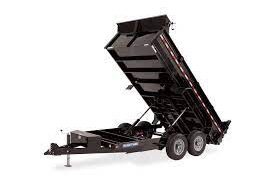In the field of transportation, having dependable and effective equipment is crucial to maintaining operations and coping with the demands. For a lot of businesses, leasing a semi trailer provides a flexible and cost-effective alternative to buying. The main question is: Is semi trailer leasing an ideal option?
No matter if you’re a fresh company owner, an experienced manager of a fleet, or someone who is looking to get into the world of trucking, In this blog, we’ll go over the details of semi trailer leasing and sales products that can be leased, types of Leasings and its function in the market to assist you in making an informed choice. Considerations to take into consideration prior to signing to leasing.
What is Semi Trailer Leasing and Sales?
Before you get into the details, it’s essential to know the basics of Semi trailer leasing and sales.
Semi trailerleasing is the method of renting a semi-truck, or trailer for a specific time period, usually ranging from one and five years. Leasing permits companies or individuals to use the equipment, without being liable for the entire cost of ownership. If the lease expires the leasee has the option to either return the truck or buy it for cash or lease a brand new one.
However, semi trailer sales involve buying the trailer in full, usually with either a down payment or an entire purchase. The purchaser becomes proprietor of the trailer or truck and takes full responsibility for the maintenance, repairs and other expenses associated with ownership.
Types of Leasing
Leasing is not a single-size-fits-all solution. There are many types of lease agreements, each suited to the specific needs of a business.
1. Operating Lease
Operating leases are short-term in nature and the leaser (user) does not acquire control of an asset. This is a great option for companies that require equipment for short-term projects for example, construction companies leasing semi trailers at peak times.
2. Finance Lease (Capital Lease)
The finance lease can be described as a lease agreement in which the holder ultimately takes over the asset at the conclusion of the lease period. This kind of lease is widely used by companies looking to make a long-term lease on semi trailers and sales, but without paying the entire cost of the purchase upfront.
3. Sale and Leaseback
In a leaseback and sale agreement, a company leases their equipment to a leasing firm which leases it to the leasing company for continuous use. This method helps companies to free up capital while keeping vital equipment such as semi trailers.
4. Full-Service Lease
A full-service lease provides repairs, maintenance, as well as operational support. Transportation and logistics companies favor this option of leasing to ensure that their fleets run smoothly without having to worry about maintenance costs.
Each type of lease serves specific purposes and allows companies to pick the right type of lease depending on their operational and financial requirements.
What Products Can Be Leased?
Any asset that can provide an investment over the long term can be leaseable. The most popular products that are leased comprise:
- Transportation equipment and vehicles (cars trucks, semi trailers, etc.)
- Heavy machinery and construction equipment (excavators bulldozers, cranes, excavators)
- Equipment for business and office use (printers, furniture, computers)
- Equipment for healthcare and medical use (MRI machines bed in hospitals)
- Real property (commercial warehouses, properties offices, warehouses)
- Software and technology (servers, SaaS subscriptions, high-end computing devices)
While business and personal leases are available however, the commercial industry gets the benefit of leasing large-scale equipment for example, semi trailer leasing or sales, which can help reduce the cost of operations and increase efficiency.
The Role of Semi Trailer Leasing and Sales in the Industry
Semi trailers play an important role in freight, logistics, or delivery. Companies that require transport for cargo typically opt for semi trailer leasing and sales over buying new trailers. Leasing offers businesses operational flexibility, which allows businesses to increase or down in response to the demands.
Why Lease a Semi Trailer?
- Cost savings: Leasing can reduce the capital investment upfront required to buy the trailer.
- Flexibility: Businesses can alter their fleet size according to market or seasonal demand.
- Maintenance Benefits: Several lease agreements cover repairs and maintenance, which can reduce the time between repairs.
- Access to modern equipment Leases allow businesses to upgrade their equipment without the need to sell their old trailers.
If a business requires a flatbed, dry van refrigerated trailer, specific equipment, leasing can be an economical alternative to buying the equipment outright.
Why Leasing is a Smart Choice
The leasing option has numerous advantages in comparison to purchasing, which makes it an ideal choice for companies across a range of sectors.
- Lower Initial Costs – Leasing removes the need for large upfront costs and frees money for other operations in the business.
- Flexible Terms: Businesses are able to select long-term or short-term lease agreements that are based on their requirements.
- Tax Benefits of Lease Payments – Lease payments can be tax deductible as business expenses.
- Low Maintenance Costs – Many lease agreements provide maintenance and repair.
- Technologies and equipment upgrades Leasing permits businesses to utilize new equipment without the expense of owning it.
For businesses who are involved in semi trailer leases and sales, these advantages provide leasing as an alternative to purchasing, particularly for expanding fleets.
Essential Aspects of a Lease Agreement
Before signing a lease, the business should take into consideration the following aspects:
- The length of time you use the lease Needs for Long-Term or Short-Term determines the most appropriate lease type.
- The Total Cost for Leasing The total cost of leasing against the possible purchase cost.
- Responsibilities for Maintenance and Repair Certain leases provide maintenance or repair, while some leases require lessees to manage repairs.
- Buyout Options – Determine whether the lease permits purchasing assets at conclusion of the lease.
- Demand and Market Trends – Industries that experience fluctuating demand, such as logistics, can benefit from the flexibility of leasing.
Through careful analysis of these aspects, companies can reap the advantages of leasing and improve their financial plan.
Semi trailer leasing and sales companies provides a low-cost and efficient way to increase their fleet without the expense of ownership. If you’re a reputable trucking company or a seasoned owner of your fleet, leasing may offer you more flexibility, with lowerupfront costs and access to the most recent technologies.
There are a variety of different leases which are available such as the operating lease, financial leases or fully service leases. Businesses can choose the type of lease that best suits their requirements. Furthermore, leasing helps companies to remain competitive, by providing access to modern trailers and trucks without lengthy commitments.
Before signing the lease agreement It is crucial to think about the main features of a lease agreement that include the length, cost of the entire amount, and obligations to keep and the option to buy out. If you take a thorough review of leasing, companies can make educated decisions that are in line with the financial goals of their business.
Semi trailer sales and leases are vital for the transport and logistics industry as they offer the chance to maximize the use of resources and improve the efficiency of operations. If you’re considering leasing semi-trucks make sure to assess your requirements and also research alternatives to ensure that you select the most suitable leasing option for your company to expand.



































